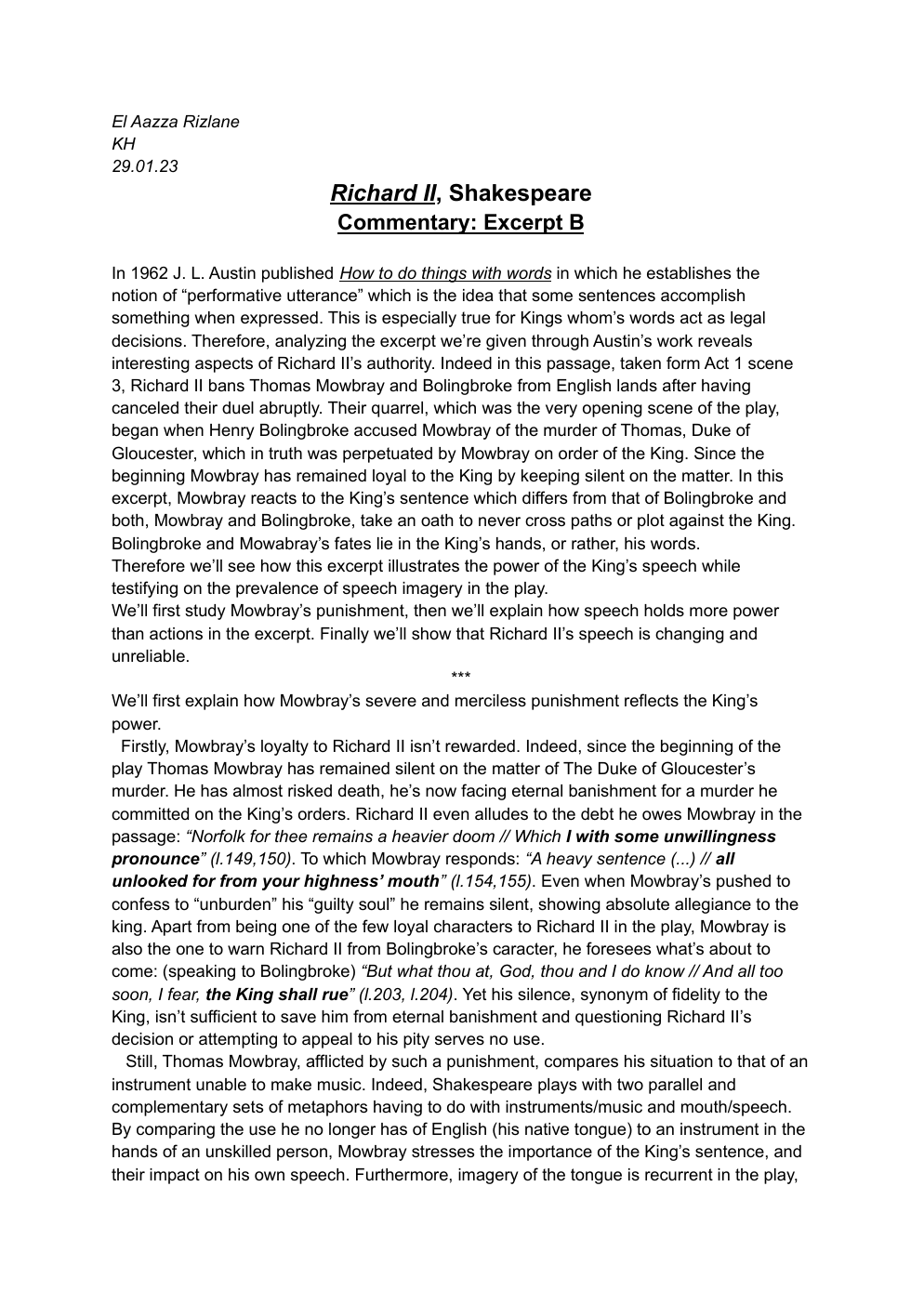Richard II, Shakespeare Commentary: Excerpt B
Publié le 09/02/2023
Extrait du document
«
Richard II, Shakespeare
Commentary: Excerpt B
In 1962 J.
L.
Austin published How to do things with words in which he establishes the
notion of “performative utterance” which is the idea that some sentences accomplish
something when expressed.
This is especially true for Kings whom’s words act as legal
decisions.
Therefore, analyzing the excerpt we’re given through Austin’s work reveals
interesting aspects of Richard II’s authority.
Indeed in this passage, taken form Act 1 scene
3, Richard II bans Thomas Mowbray and Bolingbroke from English lands after having
canceled their duel abruptly.
Their quarrel, which was the very opening scene of the play,
began when Henry Bolingbroke accused Mowbray of the murder of Thomas, Duke of
Gloucester, which in truth was perpetuated by Mowbray on order of the King.
Since the
beginning Mowbray has remained loyal to the King by keeping silent on the matter.
In this
excerpt, Mowbray reacts to the King’s sentence which differs from that of Bolingbroke and
both, Mowbray and Bolingbroke, take an oath to never cross paths or plot against the King.
Bolingbroke and Mowabray’s fates lie in the King’s hands, or rather, his words.
Therefore we’ll see how this excerpt illustrates the power of the King’s speech while
testifying on the prevalence of speech imagery in the play.
We’ll first study Mowbray’s punishment, then we’ll explain how speech holds more power
than actions in the excerpt.
Finally we’ll show that Richard II’s speech is changing and
unreliable.
***
We’ll first explain how Mowbray’s severe and merciless punishment reflects the King’s
power.
Firstly, Mowbray’s loyalty to Richard II isn’t rewarded.
Indeed, since the beginning of the
play Thomas Mowbray has remained silent on the matter of The Duke of Gloucester’s
murder.
He has almost risked death, he’s now facing eternal banishment for a murder he
committed on the King’s orders.
Richard II even alludes to the debt he owes Mowbray in the
passage: “Norfolk for thee remains a heavier doom // Which I with some unwillingness
pronounce” (l.149,150).
To which Mowbray responds: “A heavy sentence (...) // all
unlooked for from your highness’ mouth” (l.154,155).
Even when Mowbray’s pushed to
confess to “unburden” his “guilty soul” he remains silent, showing absolute allegiance to the
king.
Apart from being one of the few loyal characters to Richard II in the play, Mowbray is
also the one to warn Richard II from Bolingbroke’s caracter, he foresees what’s about to
come: (speaking to Bolingbroke) “But what thou at, God, thou and I do know // And all too
soon, I fear, the King shall rue” (l.203, l.204).
Yet his silence, synonym of fidelity to the
King, isn’t sufficient to save him from eternal banishment and questioning Richard II’s
decision or attempting to appeal to his pity serves no use.
Still, Thomas Mowbray, afflicted by such a punishment, compares his situation to that of an
instrument unable to make music.
Indeed, Shakespeare plays with two parallel and
complementary sets of metaphors having to do with instruments/music and mouth/speech.
By comparing the use he no longer has of English (his native tongue) to an instrument in the
hands of an unskilled person, Mowbray stresses the importance of the King’s sentence, and
their impact on his own speech.
Furthermore, imagery of the tongue is recurrent in the play,
the initial dispute between Mowbray and Bolingbroke is the “bitter clamor of two eager
tongues” and now Mowbray’s tongue is “no more // Than an unstringèd viol or harp, // Or
like a cunning instrument cased up // Or, being open, put into his hands // That knows no
touch to tune the harmony.” (l.161-165).
Finally, Richard’s authority is also reflected in the extent of Mowbray’s punishment
compared to Bolingbroke’s.
Indeed, Henry Bolingbroke initially faces 10 years of banishment
while Mowbray faces eternal exile: “the dateless limit of thy dear exile” (l.151) which is
enhanced by the use of “determinate”(l.150) and Mowbray’s metaphor “to dwell in endless
nights” which is contrasted by his “country’s light”.
Richard’s authority cannot be challenged
or questioned as we can see when Mowbray expresses his distress, Richard replies: “After
our sentence, plaining comes too late” (l.175) which says how irrevocable the King’s words
are, Richard himself speaks of “hopeless word”(l.152) concerning Mowbray’s sentence.
***
Now we’ll see how in the passage words are as powerful – if not more – as actions.
This
idea is expressed through the oath taken by Bulingbroke and Mowbray and through the jail
imagery used by Mowbray.
Firstly, as God’s deputy on earth, the King’s speech is most powerful.
Indeed, by making
both culprits take an oath Richard II is exercising his divine right.
According to Tudor
authorities, Richard’s power is based on the divine rights of Kings.
Because of Richard’s
“body politic”, idea established by E.Kantorowicz which considers a King’s body immortal
when embodying God’s power, Shakespeare uses “us”, “our” instead of “me”, “mine” when
Richard is speaking:....
»
↓↓↓ APERÇU DU DOCUMENT ↓↓↓
Liens utiles
- Richard Feynman: La Nature de la physique
- SHAKESPEARE: La mort peut-elle avoir un sens ?
- Richard Evelyn Byrd
- « L'histoire humaine, c'est un récit raconté par un idiot plein de bruit et de fureur, et qui ne signifie rien » Shakespeare - Macbeth.
- L'égalité ? Foutaises. Cent concierges ne vaudront jamais un Shakespeare







